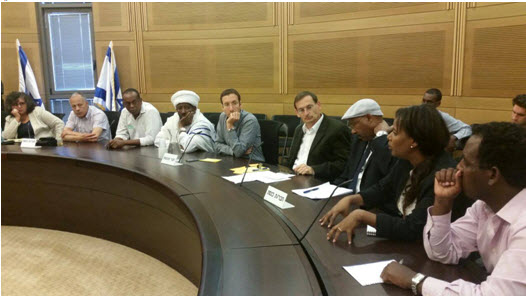Dozens of Ethiopian-Israeli social activists met with Knesset members for an emergency meeting on Tuesday, May 12, to discuss the issue of racism following recent demonstrations against the treatment of their community. Hadash MK Dov Khenin (Joint List), who hosted the meeting along with former MK Pnina Tamano-Shata, said that after hearing serious claims about police discrimination, a dangerous trend in segregated schooling, disproportionate rates of jailing of Ethiopian Israelis, and more, what stands behind all these phenomena is “one harsh word: racism.” Khenin said.the “racism is a disease that harms many sectors in Israeli society and threatens all of us.” Among the MKs who participated in the emergency meeting were three members of the Political Bureau of the Central Committee of the Communist Party of Israel: Aida Touma-Sliman, Abdallah Abu-Ma’arouf, and Khenin.

The emergency meeting held on Tuesday, May 12, to discuss the issue of racism following recent demonstrations against the treatment of the Ethiopian community in Israel (Photo: Hadash)
It is the last 30 years of discrimination, said Tamano-Shata, which led to the protests around the country in recent weeks. In light of the racism in Israel, she added, the young generation of Ethiopian-Israelis is tired of “adhering to the polite ways of the Ethiopian community.” Furthermore, “we must not settle for the fact that there is an Ethiopian MK,” she said, claiming the Knesset is still not doing enough for the Ethiopian-Israeli community. She went on to accuse the Knesset of thwarting efforts to promote laws that would assist in the eradication of racism and discrimination. “Indeed the power of the law is limited,” Tamano-Shata maintained. “However, judicial authority sends an important message and level of protection.”
Ziva Mekonen-Degu, executive director of the Israel Association for Ethiopian Jews, spoke at the meeting and said that despite many discussions in recent years, there has been no real change. She claimed that the reason the video of Damas Pakada being beaten by police drew so much attention is because he was wearing the IDF uniform when assaulted, but the problem is wider and deeper than that one story.
Text books don’t tell the story of the Ethiopian Jews, Mekonen-Degu said, claiming that the Absorption Ministry keeps Ethiopian-Israelis ghettoized in the same neighborhoods, and police brutality is a daily event. “The question now is whether we will turn a new page. The solutions aren’t easy. We are talking about equal rights and providing targeted solutions.”
Koby Getahune, one of the organizers of the protests, asked the Knesset members at the meeting “Aren’t you tired of setting up committees of inquiry all the time? Apparently Knesset members aren’t authentically interested in the community.” Other activists present at the meeting also posed difficult questions and reiterated that it was time for the Knesset to start working with the community to ensure its problems are actually dealt with.
Hundreds marched on Tuesday in Haifa to protest racism and discrimination against Ethiopian Israelis. The peaceful march, from Gan Haem to Kikar Sefer at the top of Mount Carmel, was accompanied by a large contingent of police. Protestors carried signs among them some that read “Today It’s Me, Tomorrow It’s You,” “Being Black is Not a Crime” and shouted slogans calling for police who act violently to be put in prison.
Haifa resident Avishai Adaneh, 32, who came to Israel from Ethiopia when he was 2 years old, told journalists: “For 30 years I’ve been suffering from racism of the police and from every other place in the Israeli establishment. We just want equality. We are all human beings.” Rivka Abara, 28, from Haifa, held a sign that read: “I am black and beautiful,” a verse from the biblical Song of Songs. According to Abara, the protest was meant to raise awareness in the Israeli public. “The Israeli public is extremely varied in its attitudes but, in general, we are disregarded. We suffer from latent racism,” she said. Her generation is different from her parents’ who were silent in the face of discrimination, Abara added.
Related:
Ethiopian-Israelis’ Protest vs. Police Violence and Racism is Met with More of the Same


